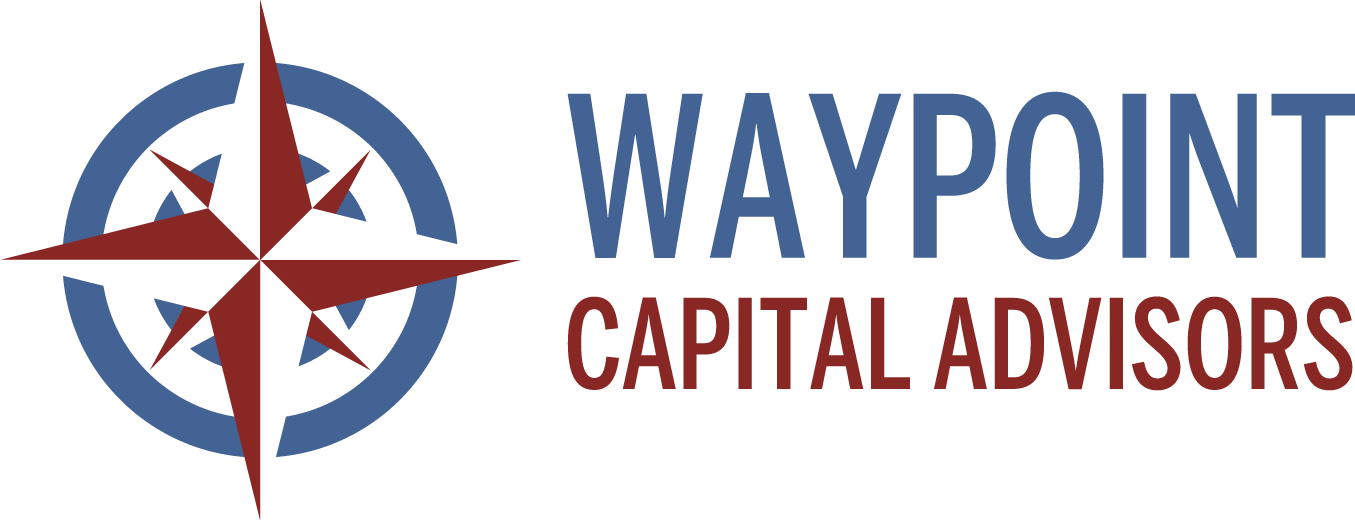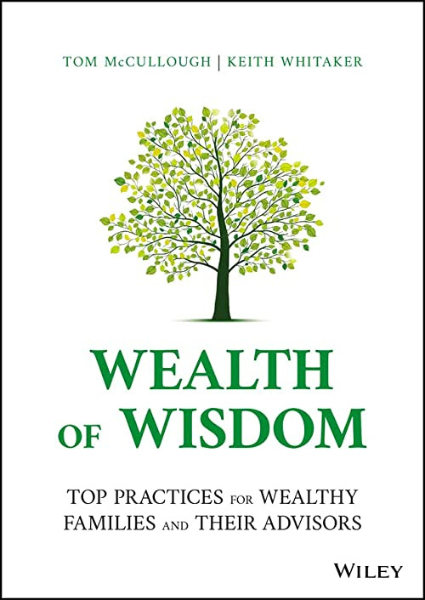Introducing: Wealth of Wisdom: Top Practices for Wealthy Families and Their Advisors
WCA’s Principal & Managing Member, Mark Pletts, has written a chapter diving into advisor related fees in a brand-new book co-authored by Tom McCullough and Keith Whitaker titled Wealth of Wisdom: Top Practices for Wealthy Families and Their Advisors. The book is now available for purchase through Amazon.
Mark has decades of experience in financial services, including several large Wall Street money managers, where he gained a unique perspective on the complexities of industry fees. He has learned, “If you know how someone is compensated, you can predict their behavior.”
Mark’s chapter in Wealth of Wisdom helps affluent families navigate vital questions to ask when searching for new financial services, products, or a family office. Please enjoy the chapter, Understanding Advisors’ Fees, below. For more information, please contact Mark here.
Chapter 36: Understanding Advisors’ Fees
Do you know all of the costs for the financial services and products you own? When we ask this question to affluent families, most of the time we can tell by their responses that the answer is “not really.”
Successful families have many options when they seek out financial services and products. The myriad of solutions that exist to guide families today and for future generations can be intimidating. As consumers we are constantly running cost/benefit analyses (sometimes formal, sometimes informal) of everything we purchase. The problem in the financial services industry is a lack of transparency.
To be better consumers of these services, we need to reframe the questions we ask. Most families prioritize relationships and perceived competencies when they enter an advisory relationship or purchase investment products. Price, although a topic of discussion, is not always a priority—often because it is so difficult to clarify the true costs of products and services.
Why Is What You Pay So Important?
Understanding the jargon is a good starting point. The investment industry uses “basis points” (bps) as a unit of measure, where 100 bps equals 1 percent. There- fore, 60 bps equals 6/10ths of 1 percent, or 0.6 percent. On a $10 million portfolio, a price reduction of 60 bps would equate to savings of $60,000 a year, or $600,000 over 10 years. Although savings of this magnitude may only have a nominal effect on a successful family’s lifestyle, it can have a big impact on their kids, grandkids, or the charities and causes they support. To be good stewards of the wealth that has been entrusted to you requires you to know what you are paying and saving any “bps” you can is part of that analysis.
Following is a great starting point to get your mind around some of the questions you can ask your family’s advisors. These questions are meant to be used in the service of being a good steward and not meant to be a challenge to the advisor; however, if an advisor gets defensive when asked these questions, it may be a red flag for the family.
The list of trusted advisors that support families may include attorneys, certified public accountants (CPAs), wealth advisors (both institutional and independent), and life insurance agents. As it relates to compensation in any industry, a good rule to remember is, “If you know how someone is compensated, you can predict their behavior.”
Attorneys
These seem like simple questions but it’s worth asking them of the various law firms you interview. You should never be surprised when you get a bill. Also keep in mind that a higher or lower fee shouldn’t always be the determining factor. A great attorney with a high hourly rate who can cut to the chase and provide efficient advice may be better than one with a lower hourly rate who needs to take twice as long to complete the project.
- Will you charge me per project or by the hour?
- Why do you charge this way?
- Can you estimate what my total cost will be?
- Can you provide examples of why the total cost would be higher or lower?
CPAs
You want a proactive accountant who can collaborate with your other advisors. In a perfect world your CPA would have other clients with similar balance sheets, so as to be accustomed to the complexities associated with affluence. In all your advisor relationships, great advice goes beyond the numbers.
- How many other clients do you have who are like my family?
- What is your typical fee for a tax return preparation engagement? What services are covered by those fees?
- What are some examples where you have collaborated with other advisors? What were the outcomes of those collaborations?
Institutional Wealth Advisors
Wealth advising is a murky world where everyone professes to be different yet offers similar services. The key to remember is that when you work with a team from a large institution, brokerage firm, insurance company, or a household-name entity, your advisor serves two masters. They may have corporate production requirements that dictate their compensation (the firm is the master) and they have you as a client (you are the master). A trusted advisor may be able to navigate this dual loyalty and the opaque nature of the pricing model. Still, to be a good steward, it is still important to know the costs.
There are two types of fees hitting your account:
- The fee the advisor gets all or a portion of and
- The fee charged by the products they purchase on your behalf (the advisor may or may not get a portion of that fee).
- What is the fee you as an advisor charge for the relationship I have with you?
- Do you get all that fee? (This question clarifies what the other master—the firm that employs them—is receiving.)
- Can you show me exactly what each product you have placed in my account is charging?
- Do you get any compensation from product providers?
Independent Wealth Advisors
Alongside wealth advisors in institutions, there are many independent advisory firms. This is also the structure most multifamily offices take. One of the priorities for most independent advisors is to harness the collective knowledge of all your advisors on your behalf. There is only one master in this world and that is you, the client. Still, it’s sometimes hard to get to the bottom of what you are paying. In a perfect world, your fee would be on every quarterly statement you receive. It usually is a basis point charge for the assets the firm manages for your family, an approach to fees that may be similar to the institutional advisor described previously.
The financial services world has moved away from a commission-based model to charging a fee for assets under management (AUM). The premise of this change is, “When you do better, (i.e., achieve better returns) your advisor does better.” While true at the surface level, a bit of a conflict arises for affluent families who are considering large charitable donations, gifts to children, or a sizable real estate purchase. Anything that reduces the assets an advisor manages reduces the AUM-based fee. A more recent and less common pricing model that reduces the opportunity for conflicts of interest is a flat fee not tied to the value of the portfolio but based on the complexity of the family’s financial affairs. Many advisors are less inclined to use this method as it removes the built-in growth of fees related to asset growth (market performance), which is often unrelated to the work the advisor is doing with the family. It can also be challenging to properly evaluate the family’s needs and complexity until the engagement is underway.
Here is a starting point to that discussion with your independent advisor:
- Are you able to charge me a flat fee? If yes, how would you calculate it?
- Can you outline where there may be conflicts of interest in your business model?
- If you can’t charge a flat fee, how do you handle conflicts of interest when they arise?
- How often do you review my fees?
If the answer is no to using a flat fee, then ask the set of questions that are out- lined above for the institutional advisor.
Life Insurance Agents
Many affluent families need life insurance. In the United States most of the policies one would purchase are filed with the state’s insurance commissioner. That means the commission scales that are paid have also been filed and are nonnegotiable. There is private placement insurance for larger policies where commissions and cost can be negotiated, but that is the exception, not the norm.
If your advisor is selling you life insurance, this can create a conflict of interest that you should be aware of. It may be more prudent to consider buying insurance when it is suggested by someone (i.e., an attorney, your CPA, or your wealth advisor) who is not going to sell it to you. You should make sure the life insurance discussion starts with a dialogue around objectives and a clear planning-based need, and not a solution in search of a problem.
Some questions for your insurance advisor include the following:
- Are you able to sell me both whole life as well as universal/variable life policies? Could you illustrate both for my family?
- Do you have access to all the top life insurance carriers?
- Do you get paid more to sell me one contract over the other?
- What would be the total amount of your commissions on this product?
Conclusion
Most families are hesitant to do deep discovery around what they are paying for the products and services they purchase. Knowing the costs of what you are paying may not be the final arbiter in your decision but engaging in these dialogues will make you a better steward of your wealth. This is an easier discussion when you are first interviewing advisors. If you’ve already been working with an advisor for a while, you can simply reopen the pricing conversation with the following bridge statement: “When we first started working together, I know you went through all the costs with me, but it’s been a while. Could we do that exercise again?” You will find that there is a simple math calculation to many of these discussions. More importantly, you will find that how your advisors handle these questions should affirm and build confidence in trusted relationships.
Resources
David C. Bentall, Dear Younger Me. . .Wisdom for Family Enterprise Successors. 9 Character Traits to Transform Your Leadership (Burlington, Ontario, Canada: Castle Quay Books, 2020).
John Rinehart, Gospel Patrons: People Whose Generosity Changed the World (Reclaimed Publishing, 2013).
James E. Hughes, Jr., Susan E. Massennzio, and Keith Whitaker, The Cycle of the Gift, Family Wealth and Wisdom (Hoboken, NJ: John Wiley and Sons, 2013).



